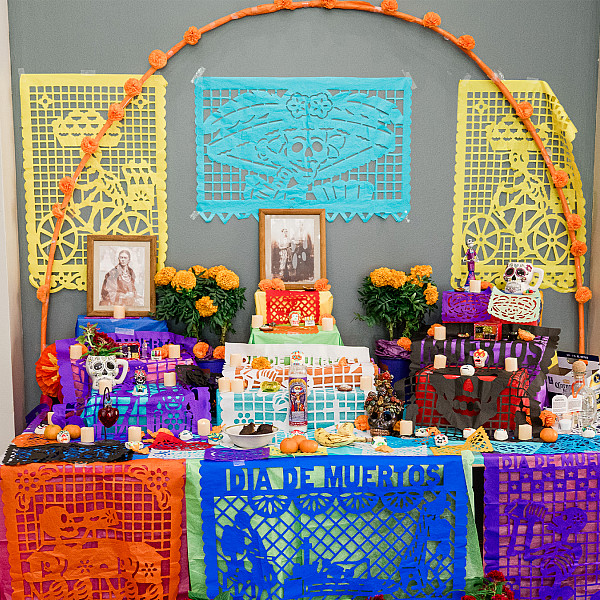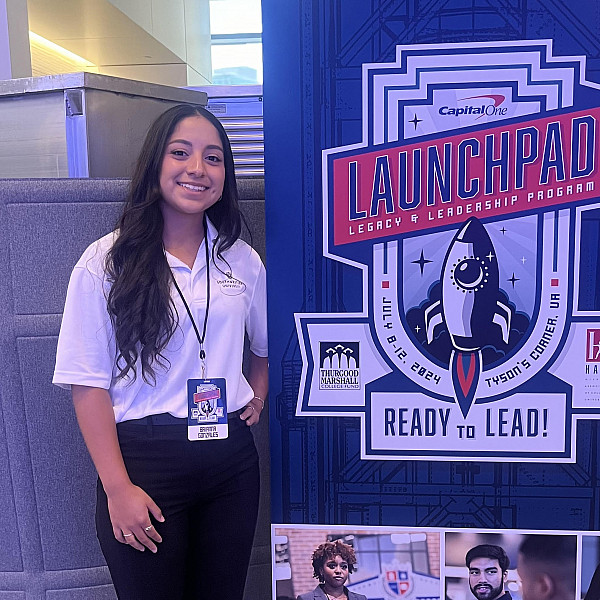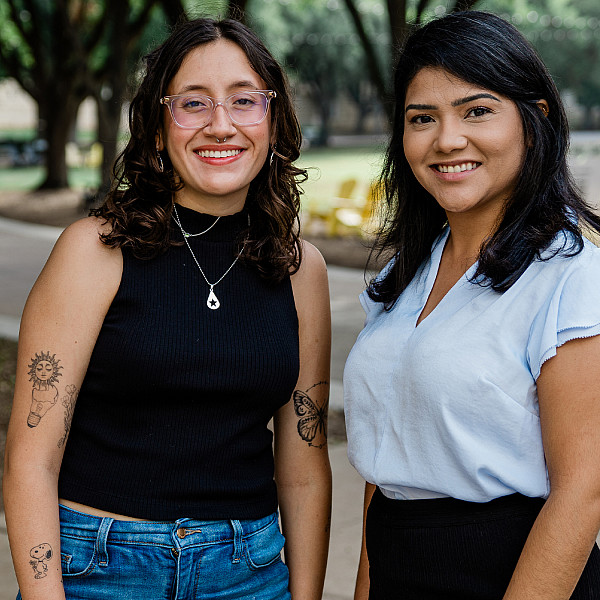News
Southwestern University Launches Spanish for Healthcare Professions Certificate
The first certificate available to current Southwestern students, Spanish for Healthcare Professions will provide participants with the opportunity to pursue in-depth Spanish language studies specific to the healthcare industry.
February 11, 2025
February 11, 2025
Open gallery

Pirates pursuing a career in healthcare will soon have another opportunity to enhance their resume as Southwestern University introduces a Spanish for Healthcare Professions certificate. Beginning this fall, students may enroll in new courses to complete the certificate in conjunction with their existing major(s) and minor(s).
Designed to immerse participants in a particular field, certificate programs provide useful courses that fulfill prerequisites, prepare undergraduates for further study, and help students acquire special skills, knowledge, and abilities that will serve them after Southwestern. Primarily developed by Associate Professor of Spanish Abby Dings and Staff Instructor in Spanish Noelia Cigarroa-Cooke, Spanish for Healthcare Professions is the first certificate offered to current Southwestern students.
“This program is designed to help students refine their Spanish skills within the specialized yet broad context of healthcare,” Dings said. “We want to build up their proficiency and cultural competence to better prepare them for professional settings where Spanish skills are increasingly valued, enhancing their ability to connect with diverse populations and navigate the job market more effectively.”
Unlike a Spanish minor, which covers a broad range of topics, the Spanish for Healthcare Professions certificate allows students to study the language in-depth in the context of healthcare. To earn the certificate, students must complete two required courses — Spanish for Medical Professions and Culture and Health in Hispanic Communities — as well as their choice of three additional courses that include health-related concepts from a list that ranges across a variety of topics and disciplines, including biology, classics, feminist studies, history, kinesiology, psychology, and sociology. A minimum three-credit Spanish for Healthcare Professions internship is also required.
“What I think is unique about our program is that it embraces Paideia in many ways,” Dings said. “It’s very discipline-focused on Spanish and thinking about healthcare professions within Spanish, but it also brings in broader perspectives from other disciplines. This is useful for all students, from students who just finished Spanish 3 and are still primarily focused on building their proficiency, to native speakers of Spanish who maybe haven’t really had a chance to talk in-depth about healthcare-related topics in Spanish.”
With a steady year-over-year increase in the number of pre-med students who also pursue Spanish majors or minors, Southwestern’s Spanish Department has debated introducing this certificate for over a decade. This semester, Dings took the first step in making that goal a reality by teaching a topics course, Spanish in Healthcare Professions. This course caught the attention of Dean of the Faculty Sergio Costola, who supported expanding the course into a certificate. The program was initially developed by Dings and Cigarroa-Cooke, refined by the Curriculum Committee, and ultimately approved by the faculty at large to begin offering in Fall 2025.
“The Spanish for Healthcare Professions certificate reflects Southwestern’s commitment to interdisciplinary learning and community engagement,” Costola said. “By equipping students with specialized language skills and cultural competencies, this program enhances their ability to serve diverse communities in healthcare. I am excited to see this initiative come to life, and I look forward to the expansion of more certificate programs that connect academic excellence with real-world impact.”
In preparing to launch the certificate, Dings and Cigarroa-Cooke applied for and received funding from the Mellon Grant for Publicly Engaged Humanities. In part, this funding allowed the duo to attend a joint conference of the Medical Organization for Latino Advancement (MOLA) and National Association of Medical Spanish (NAMS) in Chicago.
“We probably knew this intuitively, but one of the things that both of us were struck by at the conference is that research shows that when you have language concordance between a healthcare provider and a patient, it promotes better healthcare outcomes for the patient,” Dings said. “It creates a better sense of trust overall, and it improves the relationship between the provider and the patient.”
The MOLA-NAMS conference blends language education professionals with medical practitioners and providers, a crucial element that helped Dings and Cigarroa-Cooke enhance the design of the certificate program to reinforce the guiding principle that healthcare is often innately personal.
“We felt like this [certificate] would be something that would encourage students to think about the direct application of their Spanish skills,” Dings said. “But it also gives us a great opportunity to do some thoughtful cultural exploration, especially in terms of empathy. One of the concepts that was discussed at this conference was cultural humility — approaching those from other cultures with curiosity and openness and a willingness to learn, while also encouraging a lot of self-exploration and self-reflection on your own beliefs and how they might be coloring your judgement of others. I think that’s one of the many elements that are really important about this curriculum.”
Another important element of the program is the internship component. While many colleges and universities in Texas and around the country offer similarly-focused certificate programs, very few are as intentional as Southwestern about including the community as part of the educational process.
“I think what sets Southwestern apart is the community involvement,” Cigarroa-Cooke said. “Many programs are very academically-centered, but I think the strength of our particular certificate is that [students] are going to have hands-on practice, through the classes that they take and the internship opportunities. That is something that elevates us.”
Through additional funding from the Mellon Publicly-Engaged Humanities Community Partner Award Program, Cigarroa-Cooke is working with local community partners to develop opportunities for Southwestern University students pursuing the certificate. Those community partners are being duly compensated for their work, creating a reciprocal exchange of ideas and expertise.
“Each of my classes is going to have a community engagement component to it so that [students] can explore during the class,” Cigarroa-Cooke said. “I am trying to establish relationships, then strengthen them through community involvement during the classes. When that happens, hopefully we’ll have internship [opportunities].”
A native of Mexico and the daughter of a physician, Cigarroa-Cooke is uniquely positioned to use her own experiences and culture to make the certificate program as impactful as it can be, something that she’s looking forward to.
“I am super excited because this is an opportunity for me to go through my culture in a different way,” she said. “I’m not a doctor, but I have been a patient, and I know how language has impacted me. I see things from Hispanic doctors and non-Hispanic doctors that have made my interactions easier or more difficult.”
The Spanish for Healthcare Professions certificate will officially be added to Southwestern’s 2025–2027 academic catalog, but students who are currently enrolled in or have completed any pre-requisite courses may pursue the certificate by switching catalogs.
Amid the constantly changing landscape of higher education, Southwestern University leadership is optimistic that Spanish for Healthcare Professions will be just the first of many certificate options available to students in the future.
“Certificates are a truly wonderful complement to and extension of our academic program,” Assistant Vice President for Academic Affairs Jess Hower said. “As we have understood and adopted them, these programs manifest our interdisciplinary approach to the liberal arts and the value we place on transformative experiences outside of the classroom. In other words, they are very specifically and intentionally ‘Southwestern.’ Certificates give students yet another way to distinguish themselves, to show off the amazing work that they are doing — and the highly relevant, applicable skills they are gaining — for others to see. Best of all, this is only the start: we have a number of other certificates in development, all aimed at doing the very same, giving even more students the opportunity to bring their SU undergraduate experience to the next, even loftier level.”


















